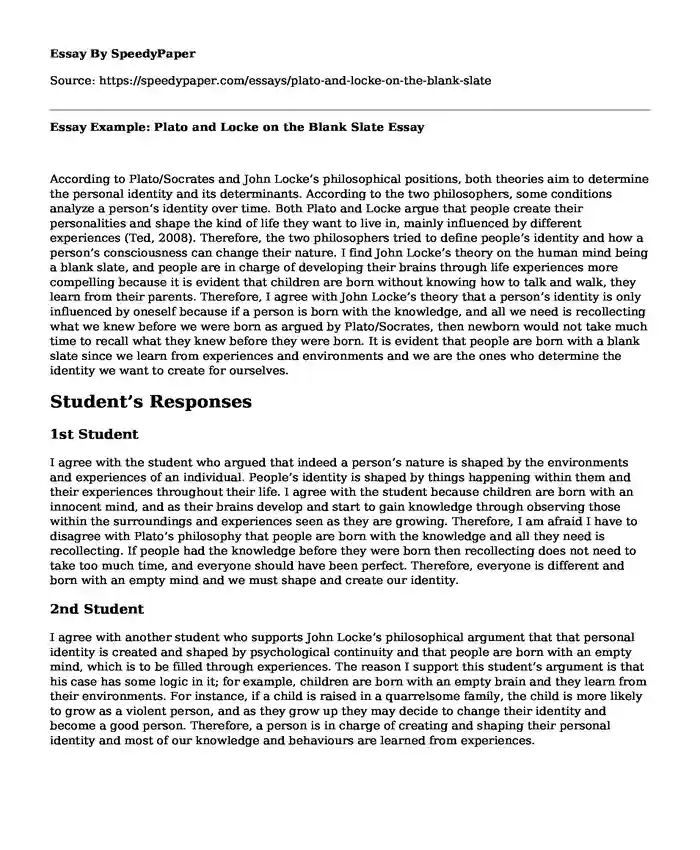
| Essay type: | Reflective essays |
| Categories: | Students Philosophers Plato |
| Pages: | 2 |
| Wordcount: | 509 words |
According to Plato/Socrates and John Locke’s philosophical positions, both theories aim to determine the personal identity and its determinants. According to the two philosophers, some conditions analyze a person’s identity over time. Both Plato and Locke argue that people create their personalities and shape the kind of life they want to live in, mainly influenced by different experiences (Ted, 2008). Therefore, the two philosophers tried to define people’s identity and how a person’s consciousness can change their nature. I find John Locke’s theory on the human mind being a blank slate, and people are in charge of developing their brains through life experiences more compelling because it is evident that children are born without knowing how to talk and walk, they learn from their parents. Therefore, I agree with John Locke’s theory that a person’s identity is only influenced by oneself because if a person is born with the knowledge, and all we need is recollecting what we knew before we were born as argued by Plato/Socrates, then newborn would not take much time to recall what they knew before they were born. It is evident that people are born with a blank slate since we learn from experiences and environments and we are the ones who determine the identity we want to create for ourselves.
Student’s Responses
1st Student
I agree with the student who argued that indeed a person’s nature is shaped by the environments and experiences of an individual. People’s identity is shaped by things happening within them and their experiences throughout their life. I agree with the student because children are born with an innocent mind, and as their brains develop and start to gain knowledge through observing those within the surroundings and experiences seen as they are growing. Therefore, I am afraid I have to disagree with Plato’s philosophy that people are born with the knowledge and all they need is recollecting. If people had the knowledge before they were born then recollecting does not need to take too much time, and everyone should have been perfect. Therefore, everyone is different and born with an empty mind and we must shape and create our identity.
2nd Student
I agree with another student who supports John Locke’s philosophical argument that that personal identity is created and shaped by psychological continuity and that people are born with an empty mind, which is to be filled through experiences. The reason I support this student’s argument is that his case has some logic in it; for example, children are born with an empty brain and they learn from their environments. For instance, if a child is raised in a quarrelsome family, the child is more likely to grow as a violent person, and as they grow up they may decide to change their identity and become a good person. Therefore, a person is in charge of creating and shaping their personal identity and most of our knowledge and behaviours are learned from experiences.
References
Ted. (2008). Steven Pinker: Human nature and the blank slate. YouTube. Retrieved from https://www.youtube.com/watch?reload=9&v=CuQHSKLXu2c&feature=youtu.be
Cite this page
Essay Example: Plato and Locke on the Blank Slate. (2023, Sep 26). Retrieved from https://speedypaper.com/essays/plato-and-locke-on-the-blank-slate
Request Removal
If you are the original author of this essay and no longer wish to have it published on the SpeedyPaper website, please click below to request its removal:
Popular categories




